Home » Health News »
‘Rapidly increasing’ COVID-19 subvariant JN.1 dominating the Northeast US

The rapidly growing JN.1 coronavirus subvariant is now responsible for approximately one-third of new COVID-19 infections in the Northeast U.S., compared to about 20% of new infections across the country as a whole.
While the public health risk remains low, studies from Columbia University and in China suggest the subvariant is escaping many people’s immunity and could lead to another wave of infections, reports CNN.
The Centers for Disease Control reports that JN.1 has already more than doubled in prevalence in the U.S. between late November and mid-December, and variant trackers say it’ll only be a matter of weeks before JN.1 is the leading coronavirus variant in the world.
Several European countries, including Denmark, Spain, Belgium, France and the Netherlands, have seen exponential growth of the subvariant and rising hospitalizations along with it. Australia, Asia and Canada have also been experiencing a rapid increase in the JN.1, and scientists believe it could be connected to waning immunity.
Only about 18% of adults had received the latest COVID-19 vaccine as of Dec. 9, and the CDC is advocating for more vaccinations, urging doctors to emphasize to their patients that it’s not too late in the season to still get vaccinated.
“Fewer people are getting the booster, and fewer people are getting Paxlovid,” an antiviral which can reduce the risk of severe COVID symptoms, said Dr. Alex Greninger, assistant director of the Clinical Virology Laboratory at the University of Washington.
The World Health Organization (WHO) designated JN.1 as a variant of interest on Tuesday, due to its “rapidly increasing spread,” but said there was a low additional health risk to the public.
Scientists have also noted that the spike in the new subvariant could be connected to heightened holiday travel.
“When I just look at the growth curve, it is rising quite sharply, and it seems to coincide with the Thanksgiving break in terms of timing,” said Dr. Shishi Luo, who deals with infectious disease research for the genomic sequencing company Helix.
Source: Read Full Article


